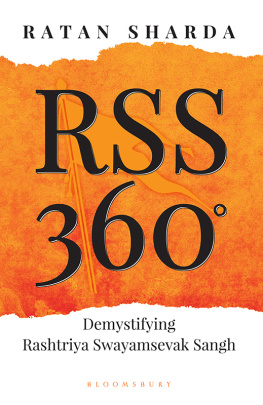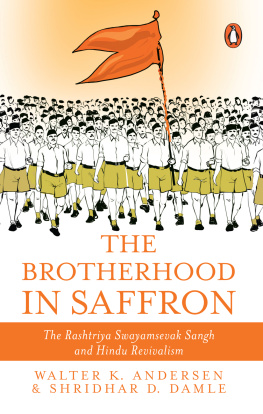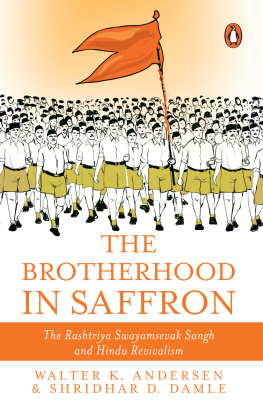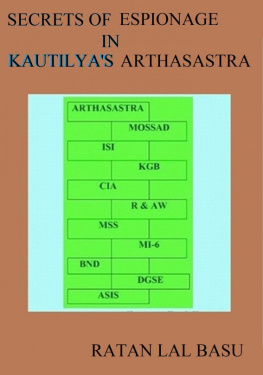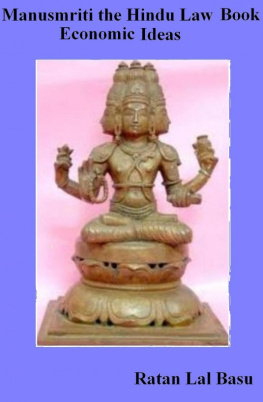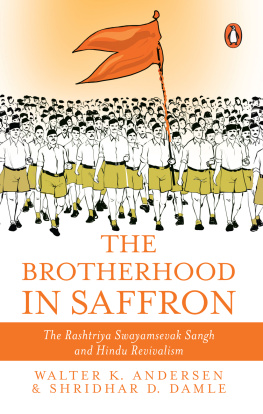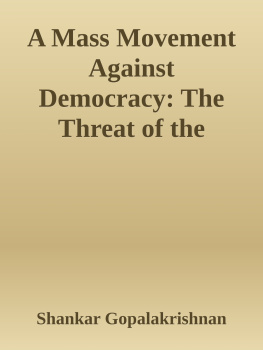Table of Contents
- Annexure V Satyagraha Against 1948 Ban and
its Successful Culmination

RSS 360
Demystifying Rashtriya Swayamsevak Sangh
RSS 360
Demystifying Rashtriya
Swayamsevak Sangh
Ratan Sharda

BLOOMSBURY INDIA
Bloomsbury Publishing India Pvt. Ltd
Second Floor, LSC Building No. 4, DDA Complex, Pocket C 6 & 7,
Vasant Kunj New Delhi 110070
BLOOMSBURY, BLOOMSBURY INDIA and the Diana logo are trademarks of
Bloomsbury Publishing Plc
First published in India 2018
This edition published 2018
Copyright Ratan Sharda, 2018
Illustrations Ratan Sharda, 2018
Ratan Sharda has asserted his right under the Indian Copyright Act to be
identified as Author of this work
All rights reserved. No part of this publication may be reproduced or transmitted in any form or by any means, electronic or mechanical, including photocopying, recording, or any information storage or retrieval system, without prior permission in writing from the publishers
Bloomsbury Publishing Plc does not have any control over, or responsibility for, any third-party websites referred to or in this book. All internet addresses given in this book were correct at the time of going to press. The author and publisher regret any inconvenience caused if addresses have changed or sites have ceased to exist, but can accept no responsibility for any such changes
ISBN: TPB: 978-9-3869-5038-3; eBook: 978-9-3869-5040-6
2 4 6 8 10 9 7 5 3 1
Created by Manipal Digital Systems
Bloomsbury Publishing Plc makes every effort to ensure that the papers used in the manufacture of our books are natural, recyclable products made from wood grown in well-managed forests. Our manufacturing processes conform to the environmental regulations of the country of origin.
To find out more about our authors and books visit www.bloomsbury.com and sign up for our newsletters
In Praise of the Book
One of the best features of Shardas book is the dozens of stories of individual swayamsevaks simplicity, discipline and devotion to the national cause. It is such tales of daily valour and sacrifice that I most enjoyed in the book. For whatever else it might be, the RSS is steadfast in its commitment to the Indian nation, to what Sri Aurobindo called Bharat Shakti in Foundations of Indian Culture. Neither an academic study such as Pralay Kanungos RSSs Tryst with Politics: From Hedgewar to Sudarshan (2002) nor a learned hatchet job such as Christophe Jaffrelots The Hindu Nationalist Movement and Indian Politics (1996), it is not even like Sanjeev Kelkars critique from within, RSS: The Lost Years (2012). Instead, Shardas account is unpretentious, even anecdotal, which is what adds to its readability and authenticity.
Makarand R Paranjpe
(Indian poet and a professor at the
Jawaharlal Nehru University, India)
Despite having known RSS for many years now, I still feel that I dont know many of the social services work that RSS does. Your book is like a manual for anyone and everyone who is interested to know about the Sangh, and much more. At a time like this when the curiosity of youth towards RSS has increased many folds, it is critically important to have a book that serves like mini-encyclopedia of the Sangh, and you have done a good job in giving a neutral point of view.
Dr. Subhash Chandra
(M.P., Head of Essel Group)
The simplicity of the RSS has yet to be revealed to the curious reader; this values based organisation finally finds expression in this 360 degree perspective by an author who is probably one of the best commentators on the 92 year old sangh.
Advaita Kala
(Writer)
Shri Ratan Shardas book is an important study on RSS, because it is written with rigor, balance and clarity. For readers like me who are not in the RSS, it provides details that many people do not know. A real eye-opener that I very much benefited from.
Rajiv Malhotra
(Dharma scholar, Founder Infinity Foundation,
Writer, Public intellectual)
Generally, there is a set format while writing about any organisation. Such a book follows a pattern, like when was the organisation founded, who was the founder, what is its philosophy, highs and lows of its working, success or failure of the organisation to achieve its objective etc. Ratan Sharda has not followed this beaten path. One has to be careful not to seek permission of the organisation about which one wishes to write. Such a writing then becomes propagandist. Ratan Shardas book has successfully avoided this trap. Instead of depending on lectures of RSS Chiefs or writings of well-known intellectuals of RSS, he has tried to present Sanghs philosophy in a different manner. He has quoted Western intellectuals of Indology extensively. He talks of need for organisation for Hindus with different global reference points that give his arguments more weight.
Ramesh Patange
(Writer, Thinker, Social activist, ex-editor Vivek weekly)
Balasaheb (Thackarey) used to feel that they should also have a dedicated cadre like Sangh. He too established shakhas of Shiv Sena
for this purpose. You can create shakhas, but you cannot create intellectual programmes for them. The strength of Sangh lay in its intellectual training, it lay in training of its cadre in human relations and management. Like Sena, socialists too couldnt grasp this. They also had shakhas but they just disappeared and the volunteers they had were left totally confused. If one wishes to understand what is taught in these intellectual training workshops, one must read this book.
Vinay Amle
(Critic, Loksatta Leading Marathi Newspaper)
Peculiarity of the book lies in the fact that the analytical mind of the author first highlights the views of the critics of RSS and then in the immediately following paragraphs presents the RSS point of views. The contrast thus highlighted leaves deep impression on the reader of the book.
I am tempted to quote below, some of the most memorable statements I came across in first edition Secrets of RSS
- India can be secular as per Indian ethos but not irreligious or non-spiritual. (Page 48)
- According supremacy of organization and the mission conquering personal ego for higher objective, promoting talent irrespective of personal likes and dislikes has led to a robust organization and a team of workers difficult to find in any other social organization. (Page 125)
- Deendayal Upadhyay proposed that every nation must have an economic and political system which is close to its chiti (inherent intellectual state or nature) only then will that model succeed. You cannot impose a system which is alien to its chiti. We can understand now, why the half-baked socialist system failed in India and why Communism has not been able to grow beyond 2-3 states. It also explains why unbridled Capitalism will not succeed in India. (Page 164)
Dr. Ashok Modak
(International affairs specialist, National Research Scholar)
There are three reasons why RSS evokes strong reactions. First, we are a power-centered society addicted to mai-bap culture. Despite democratic trappings, the bulk of the people tend to accept government as the only legitimate organization, and have a vague notion that all other associations are mere subsidiary organizations dependent on government support or patronage. Despite the freedom of associations guaranteed under Article 19(1)(c), the colonial notion that civil associations exist at governments behest continues to dominate our psyche in democratic India. RSS being self-reliant, large, and influential makes it suspect in the eyes of those who believe in state control. Second, entrenched political parties do not want a potentially rival power-centre, or strong civil association that can challenge their political supremacy or defy their will. Equally significantly, other civil associations exhibit envy at the phenomenal spread, growth and influence of one organization. Third, many citizens have genuine fears and concerns that the RSS approach to nation-building does not adequately recognize the contributions of many streams of thought, cultures, ethnic groups and civilizations to what now constitutes the wonder that is India. Detractors of RSS motivated by the first two reasons can, and should be dismissed as irrelevant. But the third group of critics cannot be ignored, and should be creatively engaged by RSS, if its quest for nation-building is to bear fruit.

